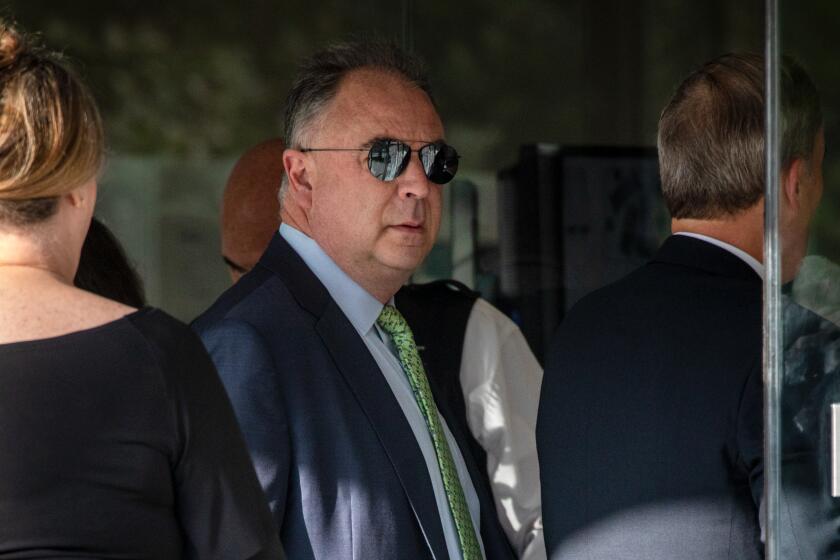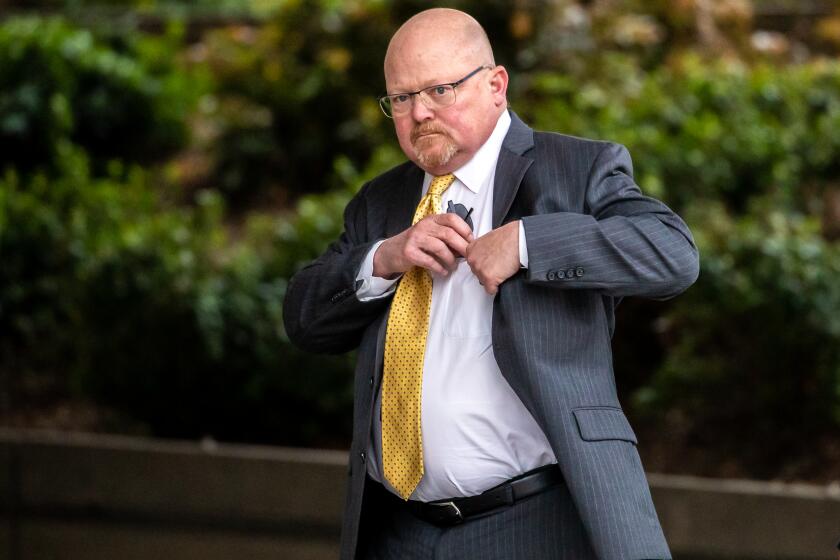Questions, anger after feds signal an end to DWP billing probe
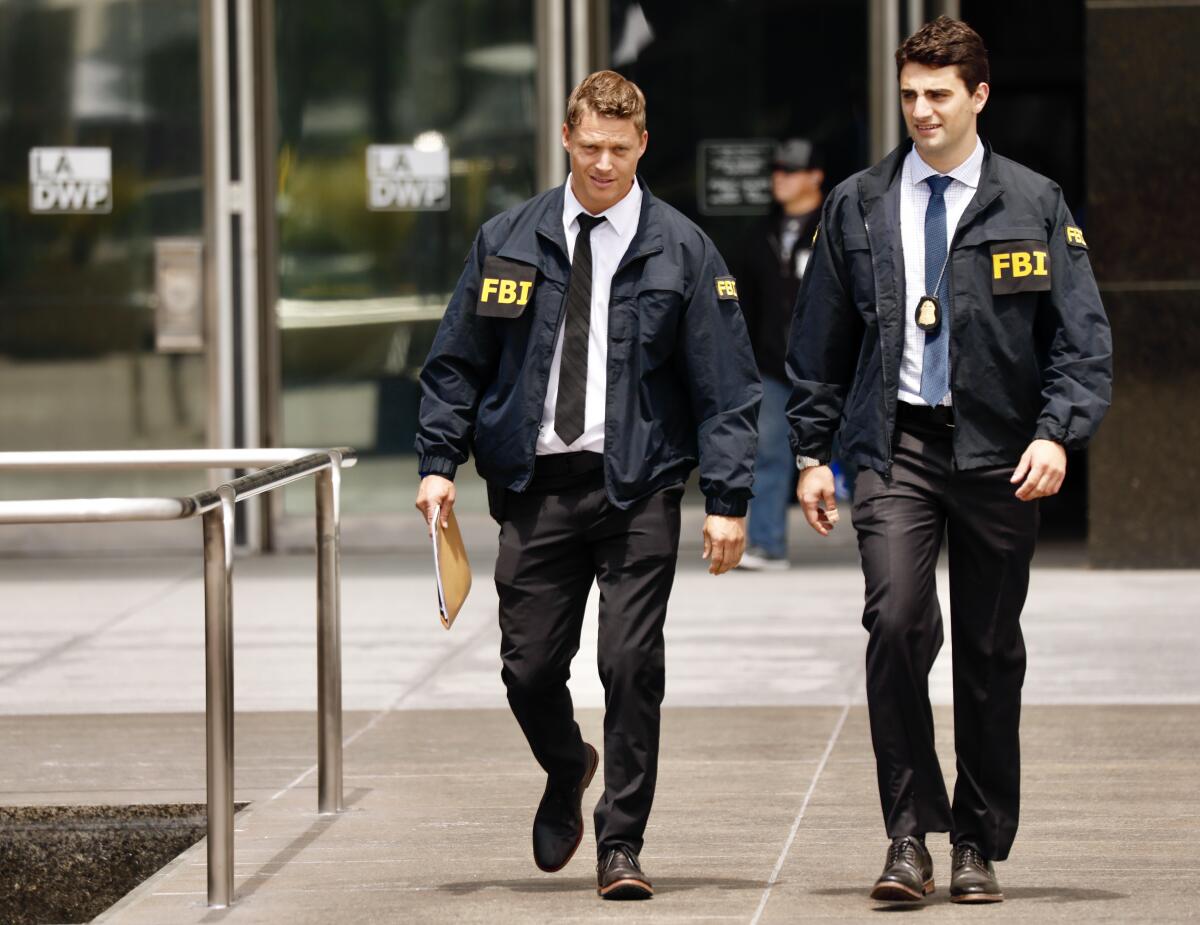
It was a shocking sight on a July morning in 2019: An FBI van parked outside Los Angeles City Hall and agents upstairs, scouring the headquarters of the city attorney’s office.
The government was there to collect evidence in a complex criminal case growing out of a scandal that erupted years earlier at another powerful city agency, the Department of Water and Power.
A new DWP billing system rolled out in 2013 proved to be a costly debacle, as well as a huge political crisis for City Hall. Customers were flooded with outrageously inflated bills, including a Van Nuys couple charged nearly $52,000.
The city attorney’s office, seeking to play the hero, swooped in. Federal prosecutors would later describe in charging documents how attorneys crafted a sham lawsuit over the faulty DWP bills and covered up their wrongdoing when the scheme unraveled. The charade has cost the city tens of millions of dollars in legal fees and other expenses.
The government probe uncovered other schemes, too. Four individuals pleaded guilty to various federal crimes, including a former high-level advisor to former City Atty. Mike Feuer, an outside attorney hired by Feuer’s office and two top DWP officials, including the general manager.
In response to inquiries by The Times, the U.S. attorney’s office said this month that its investigation into the city attorney’s office and DWP is closed. The last defendant will be sentenced next week.
But the end of the government’s case is prompting a new round of questions. Critics ask why certain individuals — including high-ranking personnel in the city attorney’s office who remain unidentified in prosecutors’ public court filings — escaped punishment.
Jack Humphreville, who chairs the DWP advocacy committee for the city’s neighborhood councils, is frustrated by the federal probe’s outcome. He wants to know who took part in the scam.
“It feels like people got off scot-free,” Humphreville said. “The whole thing stinks.”
The city’s bungling of the DWP lawsuit spurred other litigation. In one case, an attorney is seeking the government’s confidential notes to see if those documents reveal the identities of those involved in the schemes.
*
Prosecutors used the term “collusive lawsuit” in a news release in November 2021 to describe the legal scheme carried out by the city — a term that essentially meant city attorneys were secretly working both sides of the case.
The city was facing multiple class-action lawsuits from DWP customers over the billing debacle. Seeking an end to the litigation, a “senior member” of the city attorney’s office authorized a plan to settle the combined cases with a “friendly” opposing lawyer — effectively undermining the adversarial nature of the legal system, prosecutors said in a charging document against one defendant.
The goal, prosecutors said in another charging document, was to settle on the city’s “desired terms.”
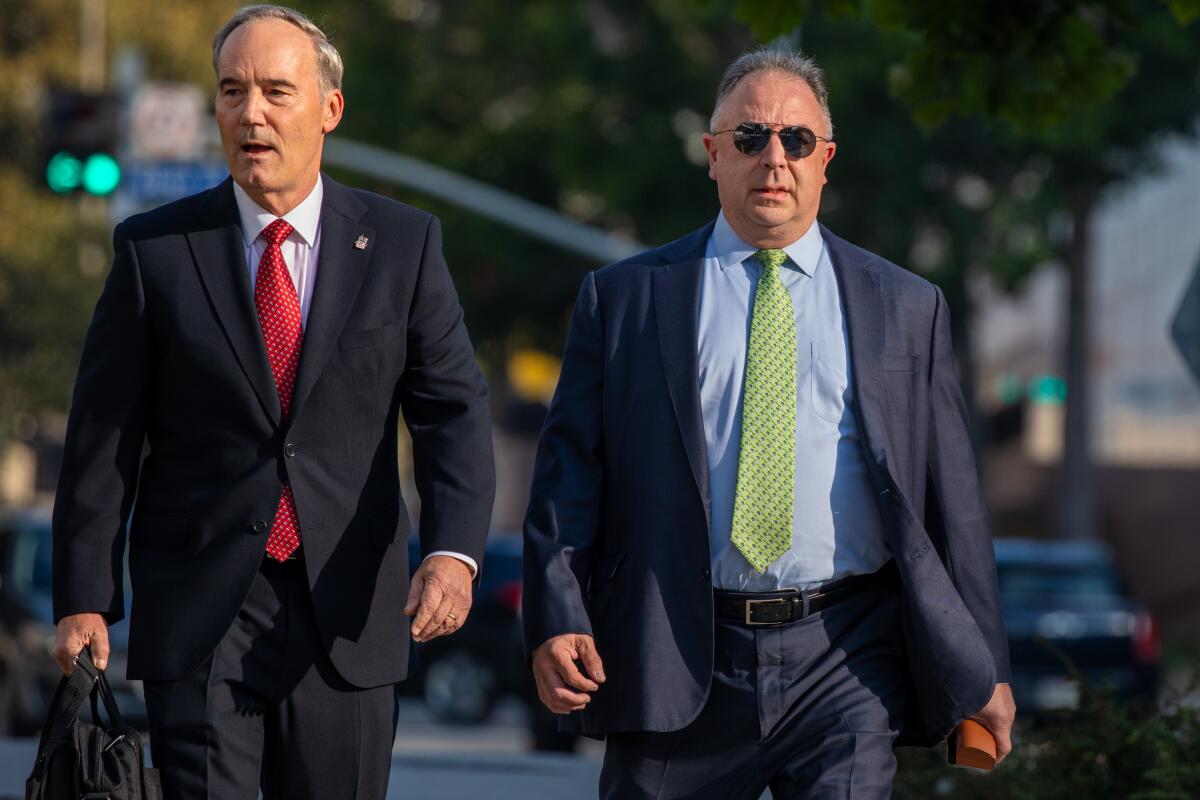
Paul Paradis, a New York attorney hired by the city attorney’s office to work on the billing litigation, helped the city carry out the collusive plan, prosecutors said.
Paradis reached out to an Ohio attorney he knew to bring a class-action suit against the city over the faulty DWP bills. Paradis secretly drafted the lawsuit, and also provided a draft to at least one member of the city attorney’s office to review before it was filed by the Ohio attorney, prosecutors said in court papers.
State Bar of California investigators are looking into how the Los Angeles city attorney’s office handled lawsuits stemming from a faulty DWP billing system launched in 2013.
Authorities never revealed the identity of the “senior member” of the city attorney’s office who directed the scheme. But prosecutors’ public court filings over a three-year period provide clues.
In a charging document filed against Thomas Peters, a former high-level advisor to Feuer, prosecutors refer to a “city attorney official” who authorized the collusive lawsuit as “senior” to Peters.
The roster of Feuer’s executive team, provided to The Times by his office in 2019, listed three people senior to Peters: Feuer; Feuer’s chief of staff, Leela Kapur; and Deputy City Atty. Jim Clark.
A massive 2019 investigation ordered by a Superior Court judge into attorney misconduct in the DWP billing case concluded that Clark “authorized” the plan for the Ohio attorney to sue the city. Clark also violated several state ethics rules, according to the investigation overseen by Edward Robbins, a former federal prosecutor.
Clark has long denied any knowledge of the scheme.
Clark retired from Feuer’s office in 2020 and collects a $3,587-a-month pension from the city, according to the city’s retirement division.
Kapur, Feuer’s former chief of staff, declined to speak to The Times.
Authorities never named or charged the Ohio attorney. Details in prosecutors’ court filings make clear that it was Jack Landskroner, who represented DWP customers in the class-action lawsuit settled by the city for $67 million.
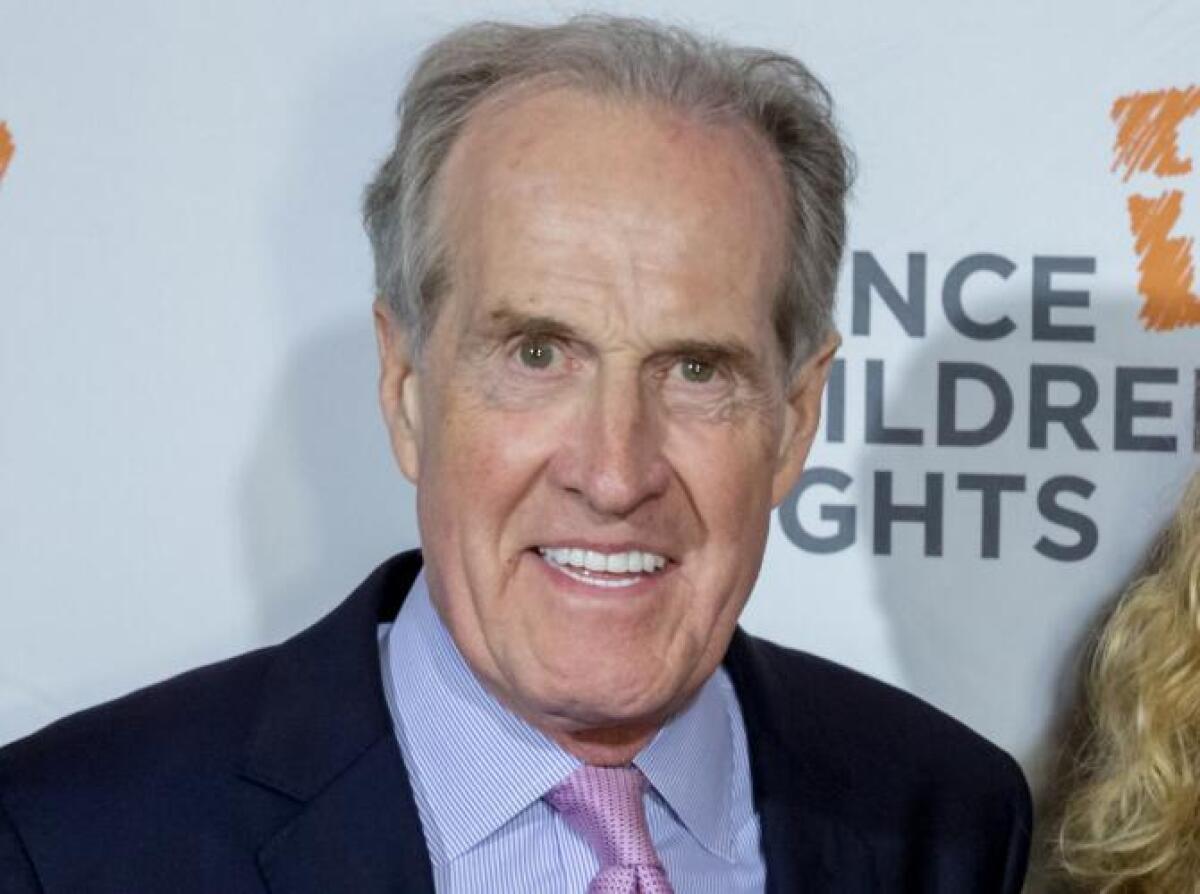
Landskroner received more than $10 million in attorney fees from the city. He died in 2021 after an illness.
The city continues to pursue the recovery of the attorney fees paid to Landskroner in an Ohio court.
Prosecutors said Paradis accepted a kickback from the Ohio attorney. He pleaded guilty to one count of bribery and will be sentenced next week.
During the federal investigation, Paradis went undercover and took part in “184 covert missions,” according to his attorneys. Prosecutors called Paradis’ cooperation in their investigation “extraordinary.”
*
Thomas Mrozek, a spokesperson for the U.S. attorney’s office in Los Angeles, declined to answer specific questions about the government’s charging decisions and spoke generally about recent public corruption cases, noting that prosecutors had “aggressively targeted officials who violated the public trust and federal law.”
“Where the evidence did not establish every element of a federal offense beyond a reasonable doubt, we have not pursued charges,” Mrozek said.
In addition to the DWP case, the U.S. attorney’s office has led cases against onetime city Councilmembers Mark Ridley-Thomas and Jose Huizar and others.
“We believe these successful prosecutions are the result of charging decisions that were based on a thorough and fair assessment of the evidence and whether the evidence established a violation of federal law beyond a reasonable doubt,” Mrozek said.
The Times interviewed several former prosecutors who worked for the U.S. attorney’s office about the government’s case. Simply taking part in a collusive lawsuit isn’t a federal crime, some said. Others saw avenues for possible criminal charges, including obstruction of justice, based on the public facts.
William Carter, who has held top positions in both the U.S. attorney’s office and L.A. city attorney’s office, said the government may have determined that its witnesses weren’t credible.
Prosecutors may also be hoping that the California State Bar, which is now investigating several attorneys involved in the case, takes action, said Carter, now a criminal defense lawyer.
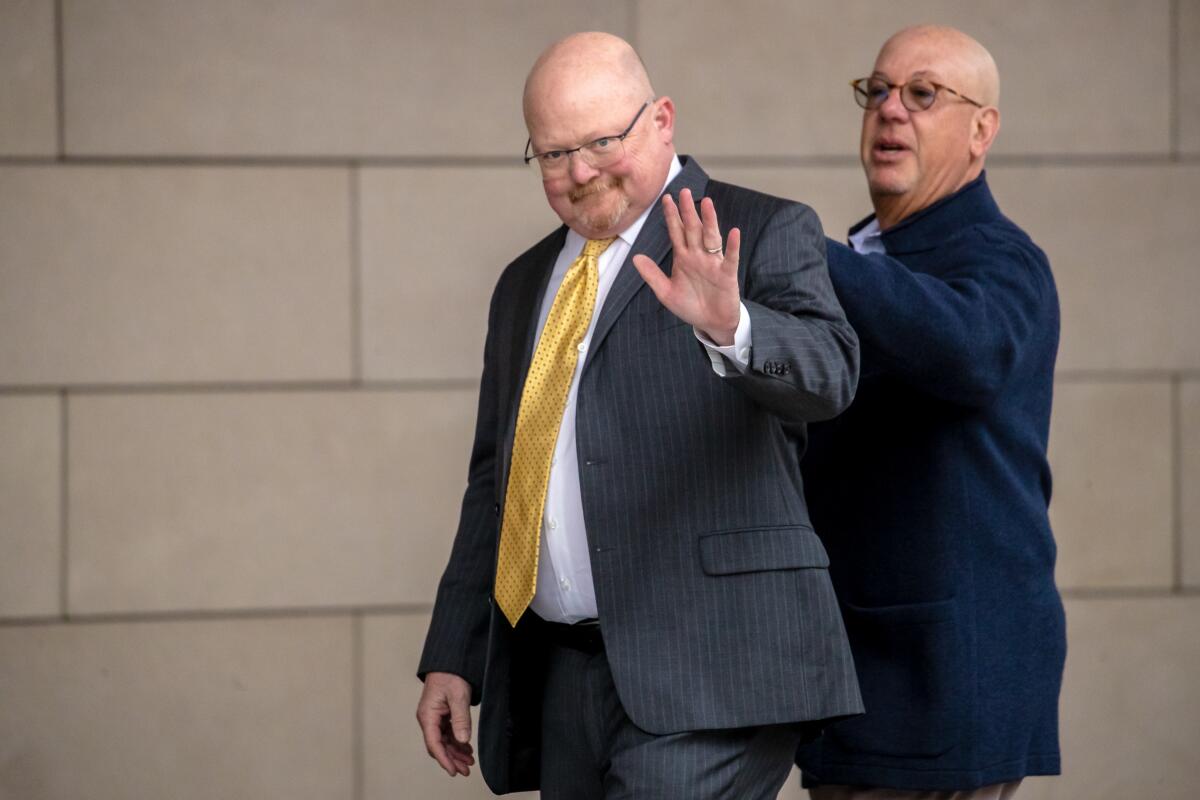
Neama Rahmani, a former assistant U.S. attorney, said prosecutors aren’t going to “tip their hand” and explain charging decisions.
“They don’t have to tell the judge, they don’t have to tell the press,” said Rahmani, now in private practice representing plaintiffs.
Some attorneys watching the government’s case said in particular they did not understand why prosecutors didn’t bring more criminal charges over an extortion scheme that ensnared Peters, Feuer’s former chief of the civil litigation branch.
In 2017, a former employee at a Beverly Hills law firm threatened to reveal the city’s collusive lawsuit, prosecutors wrote in Peters’ plea agreement.
The employee had recently been terminated by Kiesel Law, the firm headed by Paul Kiesel, an attorney who was also working for the city on DWP litigation, according to the agreement.
Kiesel’s former employee had “stolen or improperly retained” documents showing the collusive lawsuit and demanded money for their return, the agreement said.
Prosecutors said Peters, then handling civil litigation for Feuer, met with other “senior members” of the city attorney’s office on Dec. 1, 2017, and gave them an “update” on the employee’s demands.
Peters told them of a failed “mediation” between Kiesel and the employee in the cafeteria at the DWP’s headquarters.
At the Dec. 1 meeting, “Peters was directed to take care of the situation, and he stated he would do so,” prosecutors wrote.
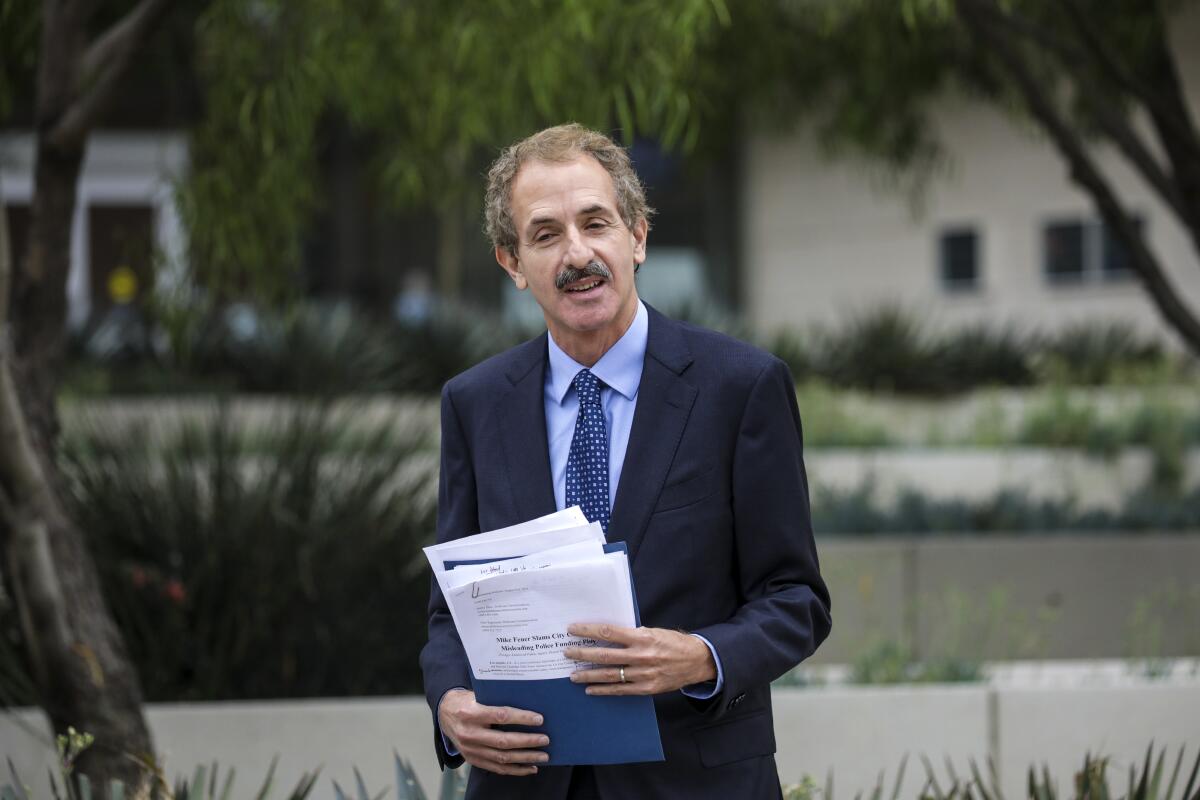
Peters ultimately threatened to fire Kiesel from his job with the city unless Kiesel got the documents back. Kiesel later told Peters that he agreed to pay the employee $800,000, prosecutors said in the agreement.
Peters agreed to plead guilty last year to aiding and abetting extortion. No one else was charged in connection with the matter.
Prosecutors have never revealed the identity of the employee or the “senior members” who discussed her threats with Peters.
Feuer’s calendar for Dec. 1, 2017, shows a scheduled meeting that afternoon with Peters, Feuer’s chief of staff Kapur, and Joseph Brajevich, a city attorney and general counsel to the DWP.
NBC4 first reported details of the calendar. A spokesperson for Feuer’s office told the news outlet that “it appears” Feuer attended the meeting, based on his schedule.
Feuer has consistently maintained he had no knowledge of the collusive lawsuit or the extortion threat. Prosecutors told Feuer in a letter last year that he wasn’t a target in their criminal investigation.
“I never attended any meeting in which there was discussion of an extortion threat to reveal collusive litigation in the DWP matter,” said Feuer, who is running for the congressional seat being vacated by Rep. Adam Schiff.
As for others scheduled to be at the Dec. 1 meeting, The Times viewed a text message sent to Peters from Brajevich in the early evening of Dec. 1, 2017.
Thomas Peters was sentenced for his role in an extortion scheme related to the Los Angeles DWP’s 2013 billing debacle.
In the text, Brajevich writes, “Thom — When you have a chance, I want to follow on the fact that the mediation took place at dwp. Not urgent and can wait until Monday. Thanks and have a great weekend.”
Brajevich, who no longer works for the city, told The Times that he didn’t know about the city’s collusive lawsuit and never participated in a meeting where there was a discussion about the employee’s alleged extortion threat. He declined to explain his text, citing attorney-client privilege and any ongoing investigations.
Jamie Court, president of the advocacy group Consumer Watchdog, said he’s outraged that more people aren’t being held accountable.
“You have the architect of the collusive lawsuit in the city attorney’s office, who is not named and free to live their life,” Court said. “And you have two attorneys — Paradis and Peters — charged when others knew about the fraud on the city.”
At a May hearing, U.S. District Court Judge Stanley Blumenfeld Jr. sentenced Peters to nine months of home detention, less than the 18-month prison sentence sought by prosecutors.
Explaining the lighter sentence, Blumenfeld suggested that he weighed Peters’ behavior against his concerns about “others.” At another point, the judge noted the number of attorneys involved in the fraud. Blumenfeld also revealed the employee’s name when he asked prosecutors if she had been charged, according to a transcript of the hearing.
The employee, Julissa Salgueiro, declined to comment about her alleged connection to the case through her attorney, William Pitman.
“She’s never been charged with a crime and has no criminal history of any kind,” Pitman said.
Carter, the former prosecutor who isn’t involved in the DWP case, said that it’s common for a federal investigation to end without tying up loose ends.
This investigation is unusual because “there are a lot of unanswered questions about who did what and why,” Carter said. “It remains unresolved, in the eyes of the public.”
Attorneys are also seeking more information. Filippo Marchino represents a DWP customer who sued several attorneys over their handling of the DWP billing lawsuit.
Marchino is seeking access to some of the government’s confidential documents in the DWP probe, including search warrants, to see if any attorneys are implicated.
Prosecutors have argued the release of the documents would hurt future investigations because it would reveal the government’s tactics.
More to Read
Sign up for Essential California
The most important California stories and recommendations in your inbox every morning.
You may occasionally receive promotional content from the Los Angeles Times.
